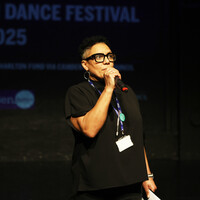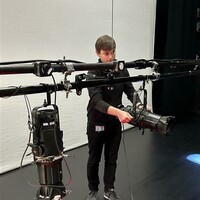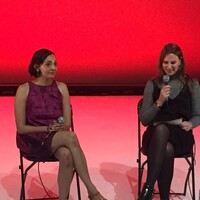Cha Jinyeob on latest work MIIN: Body to Body

News Story
MIIN: Body to Body is a visually arresting performance which sees Collective A’s critically acclaimed choreographer Cha Jinyeob examine perceptions of beauty and femininity beyond societal norms and traditions. Ahead of the indoor premiere of MIIN: Body to Body at A Festival of Korean Dance (17 - 25 June) on 24 - 25 June, we sat down with Cha Jinyeob to discuss the work and her memories of studying at London Contemporary Dance School.
Q: Can you tell us about yourself and why you started to dance?
A: I don't want to add anything to my name. I just want to be called Cha Jinyeob. My work always focuses on the world surrounding the body, a world that connects the inside and outside of the body that forms humanity as a human being and femininity as a woman, all the while continually questioning about the existence through movements. This is a journey to find one's essential value through the art form, and the ultimate motto of 'Collective A’.
I pursue an artistic life to live a complementary relationship with art in a horizontal way. I enjoy thinking alone with wine, candles and incense burning, and I like to open my eyes to the sound of birds. I worry about the environmental issues that threatens our health, ceaselessly agonising about being ‘myself’ and constantly striving to create works that resemble life.
My dance started when I was seven (foreign age of six), at that time, I just worked hard enjoying dancing without knowing what art was or what dance was. Starting with learning aerobics at a local academy, I learned rhythmic gymnastics at the age of 8, and later changed my major to ballet and started dance training in a professional way. I entered Seoul Arts High School majoring in ballet, but I felt that something didn’t fit me, and when I first met contemporary dance, I fell in love with its charm. So, I changed my major to contemporary dance and entered the Korean National University of Arts. From there I studied in the UK to deepen my learning and have since worked both in Korea and internationally.
I vividly remember the aerobic exercise I learned when I was six. Perhaps dancing was the great joy in my life at that time and everything that I could fully immerse and enjoy in daily life. I, who was introverted but liked to move my body and run around, enjoyed diving into my world with dancing.

Q: You studied at the London Contemporary Dance School. What are your memories of that time?
A: I studied at both the Seoul Arts High School and the Korea Arts University in Korea. They are prestigious art schools in Korea that teach the highest quality curriculum. Although I had been trained and experienced in well-organised education systems, I always had a craving for new things and wanted to experience and know more deeply about contemporary dance that had originated in the West. After much thought, I chose the London Contemporary Dance School and went to Edge in 2004. My lack of English was not a problem at all. Rather, I recognised more new things than I realised. To be honest, my hubris was taken away. It was a time and experience that sent me - who was probably a frog in a well - out to the big sea to realise that I could flow into the waves.
With a beginner's mind as if learning dance for the first time, I newly recognised and thought about the body and contemporary dance. It was a time that opened the way for me to think about my life and dance essentially through my experience at the London Contemporary Dance School and my life in other countries. The experience at the London Contemporary Dance School and the experience of living abroad was a time that fundamentally opened the ways of thinking about my life and dance.
Q: You've choreographed the 2018 Winter Olympics ceremonies and have been a judge on Korea’s version of Dancing With the Stars. Could you tell us about your work MIIN: Body to Body?
A: Miin (미인) is a Korean word meaning ‘beautiful person’, but is more often used as a synonym for ‘beautiful woman’. The desire for ‘beauty’ was expressed or suppressed in various ways regardless of the time and place, and as a result, women were not free from the outside gaze and could not see their own bodies as their own.
“A person goes back to a handful of dust when they die.” it is said. The performance begins with a handful of sand flowing down from the hand. It is a body that lives and moves on countless evaporations, a body that lives in the present.
MIIN: Body to Body re-examines the meaning and value of a woman's body and presents viewpoints of various horizons of the body, such as life born through the woman's body which is the body as a mother, a body at a younger age, an aged body, and a suppressed body, while it tries to look at the natural beauty and value of the current body.
Q: The Festival of Korean Dance is in its fifth year. Why is this festival important?
A: Korea currently stands out in many areas around the world. It isn't a sudden improvement in skills or unexpectedly getting lucky and recognised overnight. I think that Koreans are always working hard, growing fast, and so have always been ready.
In the first season of A Festival of Korean Dance (2018), I performed in a piece called "riverrun". The Korean Cultural Centre UK hosted various festivals, including dance, music, and films, to promote the arts of Korea, and I think it was a meaningful opportunity to join forces to bring and inform the level and status of Korean culture to the people of the UK. Currently, in the contemporary dance scene in Korea, there are talented and skilled choreographers and dancers taking an active part on the national and international stage. I hope that their excellent works keep meeting the audiences in the UK through A Festival of Korean Dance, and I thank and applaud the Korean Cultural Centre UK, which has not vaporised on a one-time basis but has continued the festival so far even in difficult periods due to COVID-19. I hope that the festival will keep continuing in the future and become a distinguished festival in the UK.


